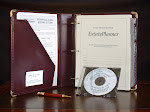Avoid "Family Civil War!" One of the most common sources for family contention when settling an estate is the distribution of personal effects (i.e., collectibles, family photos, antiques, etc.). Often, a decedent leaves it up to a successor trustee to pass these items to family members in a "fair" manner without designating which specific items should be given to each individual. Years ago, one of my clients died without indicating, in writing, how her two children should divide her furniture and art works. Her children fought over them and paid their lawyers almost $25,000 (!) in legal fees to resolve differences. The items eventually were divided, but relationships were shattered. The easy solution? Write down who is to receive your personal effects, or, at least, the procedure you wish to be followed in distributing them.
Here are some tips to effectively distribute valuables: 1) Talk to each family member privately to find out which items they would most value; 2) designate-in a dated and signed writing-which items should pass to each beneficiary; 3) be sure to specify (especially in the case of more valuable items) whether the gift counts as part of their share of the estate or is in addition to their share; 4) if two or more persons desire the same item (i.e., your piano, grandfather clock, etc.), consider specifying that the item will be distributed based on a family auction (i.e., the highest bidder receives the item and the auction proceeds are divided among all members, etc.); 5) if you leave personal effects to your spouse (and this is especially important in the case of "blended" marriages where each spouse has children from a prior marriage), specify whether your spouse should receive your items outright or merely to use until his or her death or remarriage (remainder to another). Most important (again, very important to do in a "blended" marriage): Be sure to identify which items in your household are yours or your spouse's, to better clarify who has the legal authority to dispose of them.
Sunday, August 30, 2009
Subscribe to:
Posts (Atom)



